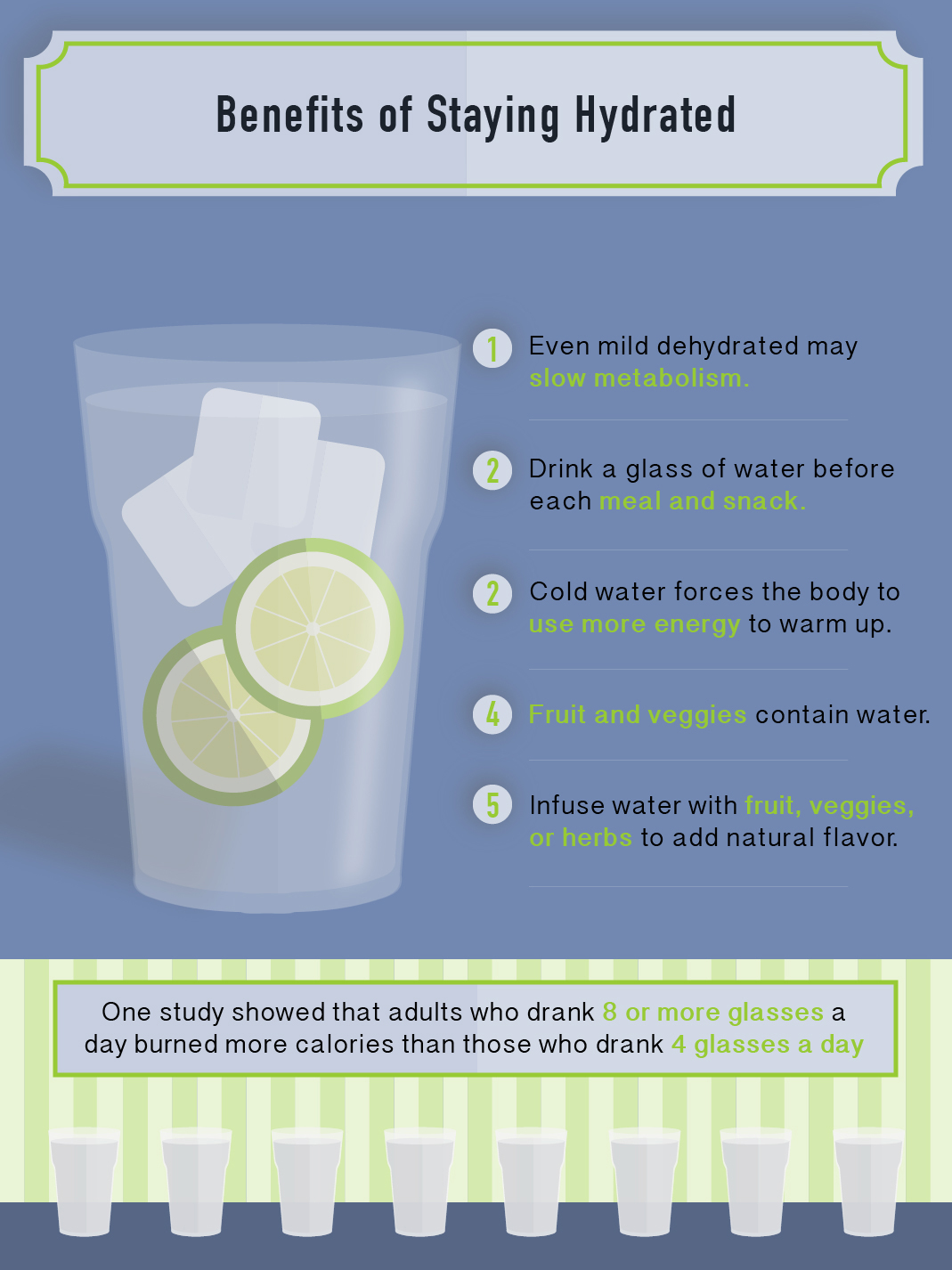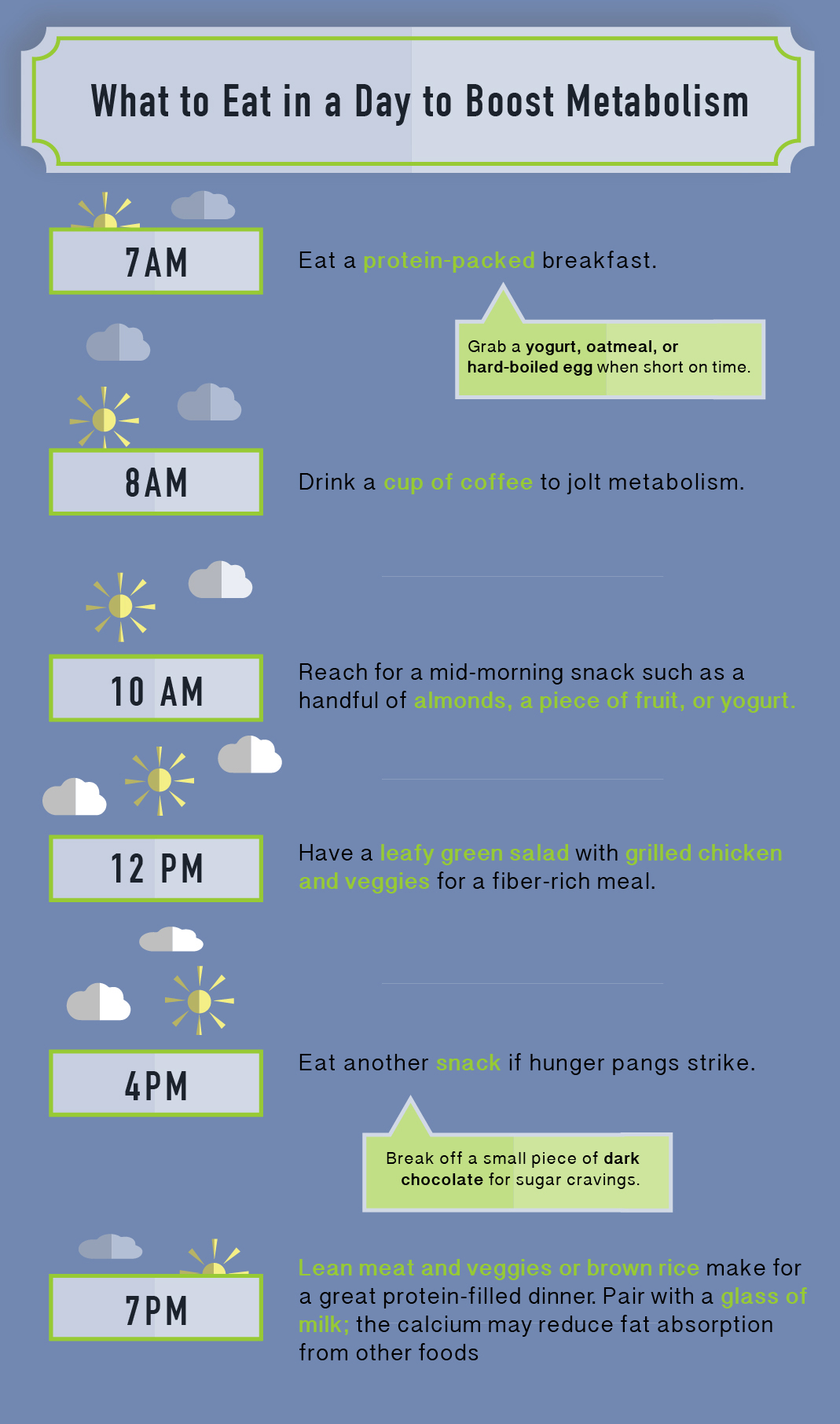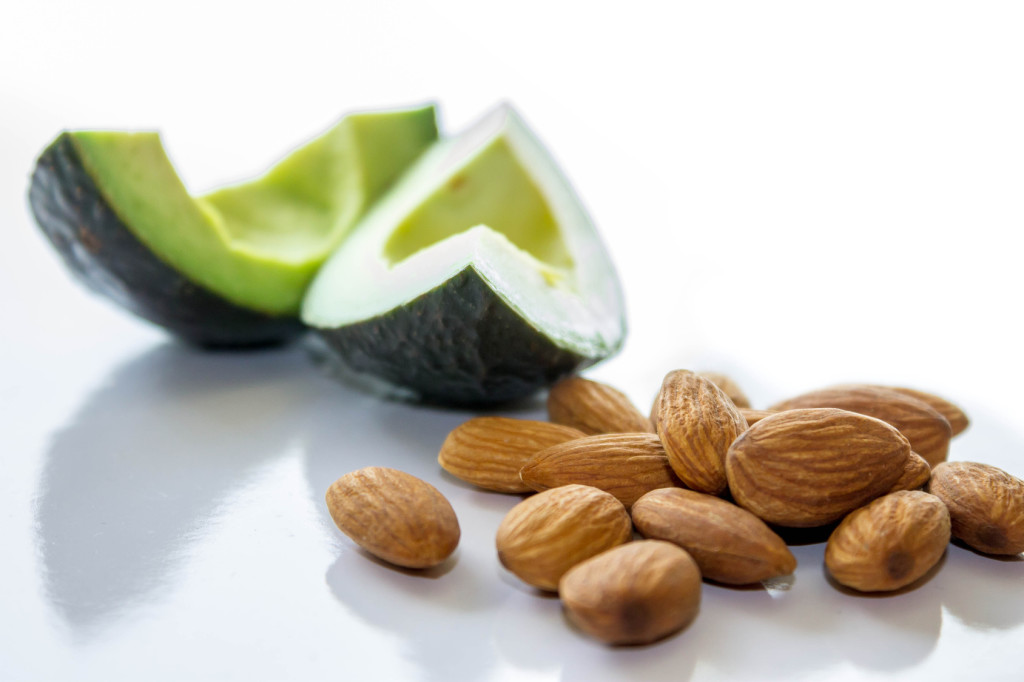Do you feel like it’s getting harder to lose weight? Your metabolism may be to blame. As we age, metabolism slows down, mostly because we start to lose about 0.5 percent of muscle mass every year, and that mass is responsible for burning calories. But don’t worry: There are ways to boost your metabolism without hitting the gym for hours on end.
What is Metabolism?
Metabolism is the chemical process in which the body converts food into energy. The number of calories a person’s body needs to perform basic functions is called basal metabolic rate (BMR). There are several factors that can influence BMR, including body size and composition (those with more muscle burn more calories), gender (men tend to have less body fat and more muscle), and age (muscle mass decreases with age). Weight gain is the result of taking in more calories than you burn.
A slower metabolism can start as early as your twenties; that’s when bone stops growing. After this age, the metabolic rate decreases by two percent or more per decade, which may be why some of us notice a few extra pounds even though diet and physical activity has been consistent.
Not all weight gain can be attributed to a slow metabolism. It’s a combination of diet, genetics,hormones, physical activity, and stress. But being more active—even if that means just fidgeting more—can help burn more calories and reduce the risk of weight gain.
Remember, in order to maximize your metabolism, it’s important to workout smarter, not harder. The key is interval training. Working out this way means you’ll decrease your fat, increase your muscle, and amplify your energy. It’s simple. It saves time. It’s effective.
How to Boost Metabolism:
Calorie Intake
As BMR decreases each decade, we need to consume fewer calories for energy. But consuming too little can have unintended consequences. If you crash diet and drop a large amount of calories from your usual daily intake, your body assumes you’re starving and will slow down your BMR to preserve energy. Losing any amount of weight, whether intentional or unintentional, slows down metabolism slightly. A crash diet may result in a drop in weight, but it is typically temporary. Decreased calorie intake can lead peoples’ bodies to burn fewer calories and gain weight faster than before a diet.
So how much should you consume?
Though it’s not an exact calculation, you can multiply your current weight by 11 to lose around a half pound to two pounds per week. So a 140-pound person who wants to lose weight should aim for around 1,540 calories a day. Don’t drop below 1,200 calories a day—research shows women who consume less than that had their resting metabolic rate plummet by 45 percent.
Bump up Protein Intake
Protein is the building block of muscle mass so it’s a good idea to eat a variety of protein sources to equal about 20 grams per meal. Digesting protein uses more energy than digesting carbohydrates or fat. Variety is key; research shows animal protein can actually speed muscle loss. Along with lean meat, add legumes and grains, such as beans, lentils, asparagus, quinoa, and buckwheat, into your diet. Eat a protein-packed breakfast such as hard-boiled eggs or Greek yogurt.
Love smoothies? Add a scoop of whey protein powder to the mix. It increases calorie burn and fat utilization and helps the body maintain muscle. One study shows whey may be the most effective non-meat protein, beating out soy and casein. If you follow a vegetarian or vegan lifestyle, try hemp protein powder for a 100 percent plant-based option that’s high in omega-3 and omega-6 fatty acids. Brown rice protein powder and pea protein powder are two more great options.
Drink Coffee
Caffeine stimulates the nervous system, which boosts metabolism. A study also found that people who drank caffeinated coffee had an average metabolic rate 16 percent higher than those who drank decaf. It’s proven to increase energy levels during exercise and help people work out harder. Sipping java is also beneficial after a workout: It can increase muscle glycogen by 66 percent. Muscle glycogen is the storage form of carbohydrates and the primary fuel for muscles.
Muscle glycogen depletes during your workout and it’s important to replenish it after exercise since it is the primary fuel for muscles. Go ahead and have a cup every morning; just don’t overload it with cream and sugar, which can add up to 70 extra calories. Avoiding empty calories (like sugar) helps people achieve and maintain a healthy weight. Another reason to skip the sweet stuff? A new study suggests a diet high in sugar can increase your risk of breast cancer.
Sip on Green Tea
Don’t like coffee? Green tea, with its caffeine content, also boosts metabolism. On top of that, it has a rich source of catechins, which are antioxidants that can reduce body fat. If you tend to drink several cups of coffee throughout the day, try switching one out for a cup of green tea in the afternoon. Drinking five eight-ounce cups of green tea daily can increase calorie burn by 100 calories per day. And when combined with three hours of moderate exercise each week, green tea can reduce abdominal fat over time. But don’t reach for the bottled stuff: It’s usually loaded with added sugar or artificial sweeteners.
Eat Smaller Meals More Often
Nibbling throughout the day instead of eating three large meals helps keep metabolism ticking along throughout the day. Try to eat at least every four hours and vary the types of food. If you go a long time without eating, you risk becoming so hungry you may overeat.
Don’t Be Scared of Carbohydrates
Carbohydrates sometimes get a bad rap because refined carbohydrates—including bagels, white bread, and pasta—can create a surge in insulin that promotes the storage of fat, decreasing metabolic rate. But good carbohydrates, like whole grains, starchy vegetables, and fruit, are an important, fiber-rich part of a healthy diet. If you crave pasta, choose a spaghetti squash recipe or whole-grain variety that won’t wreak havoc on your metabolic rate. Whole grains can help the body burn additional fat because they require more energy to break down than do processed carbohydrates.
Spice up Your Meals
Capsaicin, the substance that makes chili peppers hot, may increase your metabolism by 23 percent. It may also inhibit the generation of fat cells, so go ahead and sprinkle some red pepper flakes on your pasta dish or cook with some chopped red or green chili peppers.
Incorporate Strength Training
Since we slowly lose muscle with age, it’s important to counteract that loss. Incorporate two or three 30-minute strength-training sessions each week along with moderate exercise. Compound movements such as squats, lunges, and planks engage multiple muscles at once. Every pound of muscle uses about six calories a day, while every pound of fat only uses about two calories daily.
When you strength train, take it slow. Count to three as you lower the weight back to its start position to increase the breakdown of muscle tissue. The repair after your session boosts your metabolism for as long as 72 hours.
Interval Training
Longer doesn’t always mean better. Studies show that short bursts of intense activity combined with rest periods torches calories after you leave the gym. (So don’t worry if you don’t have an hour to kill at the gym every single day.) Try alternating one minute of fast running or biking with one minute at a much slower pace. Repeat this cycle for 25 minutes for a quick calorie-burning workout. Alternating speed with slow cardio also increases aerobic capacity and improves endurance.
Say No to That Second Drink
There’s nothing wrong with a glass of wine. In fact, enjoying one drink can raise your metabolic rate. But having two or more cocktails can cause the body to use the alcohol for energy, which reduces your its fat-burning ability.
Get More Sleep
Hitting the sack early helps keep metabolism stable. Irregular sleep patterns and lack of sleep can disrupt the hormones that help regulate energy and appetite. One study showed adults who slept for nine hours had fewer cravings for sweet and salty snacks, reduced hunger, and healthier metabolisms than those who slept for four hours.











